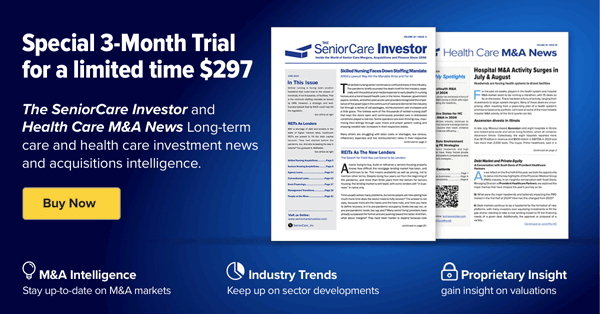Headwinds have finally slowed the healthcare M&A market. Throughout 2022, deal volume soared despite challenging market conditions, but activity in the first quarter of 2023 declined by 5% compared with the fourth quarter of 2022. The year-over-year drop was much more severe, falling 18%, or 531 deals compared with 647 deals. Factors such as growing labor costs, inflation and high-interest rates have stifled deal activity. Although we’re struggling to call any quarter with 500-plus deals slow, the opening three months of 2023 fell short of the 2022 quarterly average of 603 deals.
The swing in announced spending wasn’t nearly as dramatic. In the first quarter of 2023, announced dollar volume hit $72.5 billion, a 5% decrease from spending in Q4:22 but a 7% increase from Q1:22. The largest deal of Q1:23 was the purchase of Bothell, Washington-based Seagen Inc. by the pharmaceutical giant Pfizer, Inc. The deal was valued at $42 billion, or 21.9x Seagen’s annual revenue in 2022.
CVS also had a busy quarter in the M&A market. In early February, the retail giant announced a $10.6 billion offer for Oak Street Health, or $39 in cash per share. Oak Street Health is a major player in primary and value-based care, and the deal underscores CVS’ push into the healthcare market. CVS’ acquisition of Oak Street Health was the largest healthcare services deal of the first quarter.
Several sectors were still hot destinations for investors, despite the slowdown. There were 135 deals in the Physician Medical Group sector, a decline of 13% compared with the fourth quarter, but only five deals less than the total in the first quarter of 2022. Several private equity-backed buyers, such as MB2 Dental Solutions, Ascend Vision Partners and Dental Care Alliance, LLC all announced multiple deals this past quarter. However, other buyer types are moving into the market, possibly foreshadowing a year of intense competition between private equity-sponsored platforms, retail giants and health systems. VillageMD, a subsidiary of Walgreens, announced three transactions, while six different health systems each added physician groups to their network.
Healthcare real estate also drew in investors from all corners of the market, such as REITs, private equity firms, health systems and even physician groups. There were 54 transactions targeting medical office buildings, including Big Sky Medical Real Estate’s $190 million acquisition of a 10-property portfolio that stretches across Texas, Louisiana, Maryland and California and has a total of 857,779 square feet of space.
The Hospital sector has seen a significant decline in activity over the past year, seldom breaking 20 deals a quarter. In the first quarter of 2023, there were 15 deal announcements, compared with 20 in Q4:22. Most deals were mergers of large health systems rather than a small regional hospital takeover. Scale is essential to remain competitive, and health systems can’t achieve that with bite-sized acquisitions. After merging with Trinity Health in April 2022, Iowa-based MercyOne acquired Genesis Health System, Inc., a health system with six hospitals and more than 65 outpatient locations. The deal creates one of the largest healthcare providers in Iowa.
Health systems are focusing on the outpatient care market, such as medical office buildings, home health agencies and physician groups. They’re still busy, but increasing their hospital portfolio is no longer their top priority.
After a historic year for healthcare M&A, it seems natural for activity to slow during a “cooling-off” period, especially as investors tackle persistent industry headwinds. However, it’s not all bad news. Strong tailwinds such as demographics, favorable reimbursement measures and value-based care will keep dealmakers busy throughout the year.


